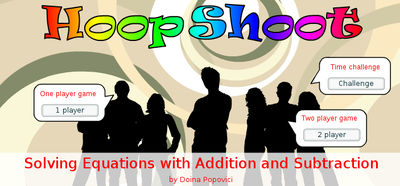Difference between revisions of "Introduction to equations"
Jump to navigation
Jump to search
KOER admin (talk | contribs) m (Text replace - "www.karnatakaeducation.org.in" to "karnatakaeducation.org.in") |
m (added Category:Introduction to Equations using HotCat) |
||
| (5 intermediate revisions by 3 users not shown) | |||
| Line 1: | Line 1: | ||
| + | <div style="width:150px;border:none; border-radius:10px;box-shadow: 5px 5px 5px #888888; background:#ffffff; vertical-align:top; text-align:center; padding:5px;"> | ||
| + | ''[http://karnatakaeducation.org.in/KOER/index.php/ಸಮೀಕರಣಗಳ_ಪರಿಚಯ see in English]''</div> | ||
<!-- This portal was created using subst:box portal skeleton --> | <!-- This portal was created using subst:box portal skeleton --> | ||
<!-- BANNER ACROSS TOP OF PAGE --> | <!-- BANNER ACROSS TOP OF PAGE --> | ||
| Line 20: | Line 22: | ||
= Concept Map = | = Concept Map = | ||
| − | + | [[File:Introduction_to_equations.mm|Flash]] | |
__FORCETOC__ | __FORCETOC__ | ||
= Textbook = | = Textbook = | ||
| Line 143: | Line 145: | ||
Create a new page and type <nowiki>{{subst:Math-Content}}</nowiki> to use this template | Create a new page and type <nowiki>{{subst:Math-Content}}</nowiki> to use this template | ||
| + | |||
| + | [[Category:Introduction to Equations]] | ||
Latest revision as of 10:37, 20 November 2019
| Philosophy of Mathematics |
While creating a resource page, please click here for a resource creation checklist.
Concept Map
Textbook
To add textbook links, please follow these instructions to: (Click to create the subpage)
Additional Information
Useful websites
Reference Books
Teaching Outlines
Concept #1 : Generalizing the form of a linear equation from data patterns
Learning objectives
- Recognise a pattern in the set of data(in this class a set of coordinates)
- Recognise the variation(proportion/nonproportion)
- Recognise varying and constant terms
- Recognise dependency of one varible with the other
- Establishing the relationship between a variable and a constant
- Generalise the relationship and expressing symbolically
- Explore the possibility of having different patterns
- Understand that every number pattern can be represented on the graph
- Joining the coordinates leads to a straight line or sometimes to non-Linear set
- Interprets the relationship between the set of points on a straight line and on the non-linear set.
- Every pair of points when joined gives a straightline(infinite points can be located between two points
- Relation between the coordinates of set of points which makes a straightline is a Linear Equation /Otherwise Non-Linear
Notes for teachers
- Every Linear Equation represents a straightline .If the relationship(pattern)between two quantities can be represented as straightline then the relationship is in the form of linear equation
- A teacher can develop a lesson on Linear Equation with Geogebra application
Activity No #
- Estimated Time
1 Period : 40 minutes
- Materials/ Resources needed
Computer(Geogebra),projector,Blackboard
- Prerequisites/Instructions, if any
- Students have been introduced to graph(pictographs,bargraph,Histograms..)
- Students can make the difference (Relationship)between axes and quadrants
- Refer to the Teaching Outline of Introduction to Coordinates
- Students are able to locate a given point on the graph if a set of coordinates are given
- Students are able to recognise coordinates of a given point on the graph
- Students can differentiate position of a point on the (NL)and also on the Quadrants
- Multimedia resources
- Website interactives/ links/ / Geogebra Applets
- Process/ Developmental Questions
(This can be done using a graph sheet also)
- Start with a Geogebra Drawing pad
- Give /ask students to give a set of coordinates
- You may get different patterns(assaign a group task)
- Ask the students to recognise coordinates of same pattern
- Ask them to extend the pattern to say many more coordinates following the same pattern
(NOTE:Students may recognise same pattern or some may not recognise the pattern. )
- Ask the students visualise the points and visualise the pattern on the grap.
- Ask them to join the points (teacher can help student to join the points by using Straight line tool in Geogebra which is more meaningfull)
- This can be extended to say that Relation between the coordinates of set of points which gives/makes/results a straightline is a Linear Equation
- Continue with some more points with line joing the points and establishing the relation ship between variables also.
- Introduction to the degree of an equation may be discussed in subsequent lessons.
- Evaluation
- Show them the graph of an equation and ask students to predict the pattern
- Question Corner
Activity No #
- Estimated Time
- Materials/ Resources needed
- Prerequisites/Instructions, if any
- Multimedia resources
- Website interactives/ links/ / Geogebra Applets
- Process/ Developmental Questions
- Evaluation
- Question Corner
Concept #2 Solution of an equation
Learning objectives
Notes for teachers
Activity No #
- Estimated Time
- Materials/ Resources needed
- Prerequisites/Instructions, if any
- Multimedia resources
- Website interactives/ links/ / Geogebra Applets
 Math Play
Math Play
*Process/ Developmental Questions
- Evaluation
- Question Corner
Activity No #
- Estimated Time
- Materials/ Resources needed
- Prerequisites/Instructions, if any
- Multimedia resources
- Website interactives/ links/ / Geogebra Applets
- Process/ Developmental Questions
- Evaluation
- Question Corner
Hints for difficult problems
Project Ideas
Math Fun
Usage
Create a new page and type {{subst:Math-Content}} to use this template